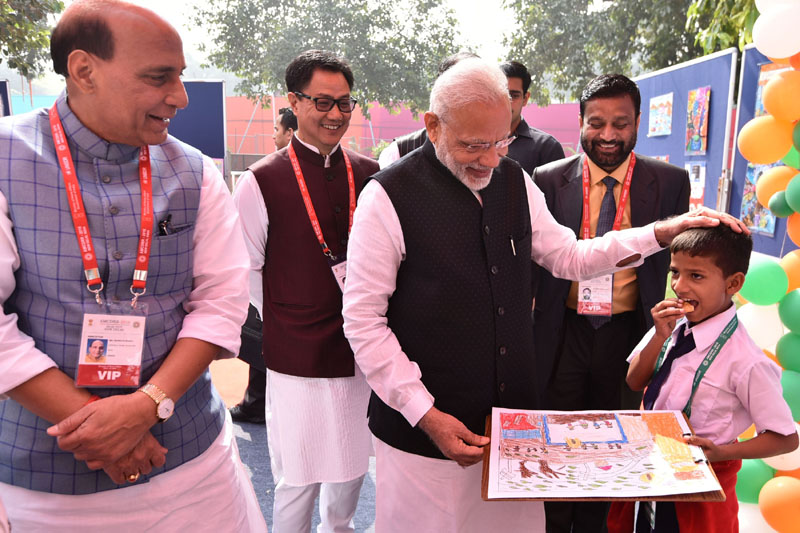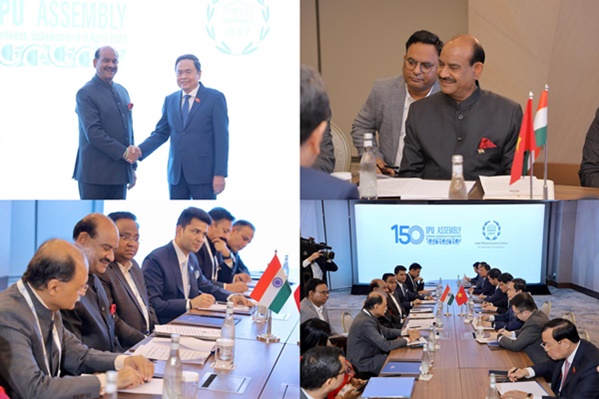Encourage leadership of women in disaster risk management: Modi
Thu 03 Nov 2016, 13:25:43

Outlining a 10-point agenda for renewing efforts for disaster risk reduction, Prime Minister Narendra Modi today stressed on encouraging involvement of women volunteers and sought greater cohesion in international response to deal with all kinds of calamities.
Inaugurating the Asian Ministerial Conference on Disaster Risk Reduction (AMCDRR) here, he emphasised on working towards risk coverage for all, starting from poor households to small and medium enterprises and multi-national corporations to nation states.He said all development sectors must imbibe the principles of disaster risk management and encourage involvement and leadership of women as they are the biggest sufferers of any disaster.
"Women are disproportionately affected by disasters. They also have unique strengths and insights. We must train a large number of women volunteers to support special needs of women affected by disasters.
"We need women engineers, masons and building artisans supporting reconstruction, and women self help groups assisting livelihood recovery," he said.The Prime Minister said there should be investment in risk mapping globally, leveraging of technology to enhance the efficiency of the disaster risk management efforts and utilising the opportunities provided by social media and mobile technologies.
He also spoke of building on local capacity and initiative, ensuring that the opportunity to learn from a disaster is not wasted and bringing about greater cohesion in international response to disasters.Modi said a fully functional Indian Ocean Tsunami Warning System has become operational and along with its Australian and Indonesian counterparts, the Indian National Centre for Ocean Information Services is mandated to issue regional tsunami bulletins.
"The same goes for improvements in cyclone early warning. In India, if we compare the impact of cyclone events in 1999 and 2013, we can see the progress we have made.... It led to a significant reduction in loss of lives from cyclones. It is now recognised as a global best practice," he said.
The Prime Minister said disaster risk reduction has a pivotal role in supporting adaptation to climate change as well as sustainable development and
it is in this context that this conference becomes timely and relevant.As many as 61 countries from Asia and Pacific region with 1,100 delegates, besides around 2,900 domestic representatives are participating the three-day conference.
it is in this context that this conference becomes timely and relevant.As many as 61 countries from Asia and Pacific region with 1,100 delegates, besides around 2,900 domestic representatives are participating the three-day conference.
The meeting will pave the way for implementation of Sendai Framework for Disaster Risk Reduction in the Asian region and will also devise a mechanism for monitoring its progress.
Modi said over the last two decades, the world, and especially Asia-Pacific region, has undergone many changes – most of them positive."Many countries in our region have transformed their economies and become engines of global economic growth. Hundreds of millions of our people have been lifted out of poverty. The Asia-Pacific region has been a global leader in more ways than one.
"But we must not take this progress for granted. There are challenges as well. Over the last twenty years, more than eight hundred and fifty thousand people died from disasters in the Asia-Pacific. Seven of the top ten countries in the world in terms of number of deaths due to disasters are in the Asia-Pacific," he said.
Modi also shared his personal experience during the 2001 Gujarat quake and said as Chief Minister of the state, he had worked with the people to support post-earthquake recovery.
The Prime Minister said there are daunting challenges ahead as the Asia-Pacific region is rapidly urbanising and perhaps within a decade more people in the region will live in cities than in villages.
"Urbanisation will pose greater challenges for disaster risk management by concentrating people, property and economic activity in smaller areas, many of them in disaster prone locations."If we do not manage this growth, in terms of both planning and execution, the risk of economic and human losses from disasters will be higher than ever before," he said.
Modi said India is ready to make its space capabilities available to any country for purposes of disaster risk management.In November 2015, India organised the first-ever South Asian Annual Disaster Management Exercise and in the spirit of regional cooperation, India will soon launch the South Asia Satellite, he said.
No Comments For This Post, Be first to write a Comment.
Most viewed from Specials
Most viewed from World
AIMIM News
Latest Urdu News
Most Viewed
May 26, 2020
Do you think Canada-India relations will improve under New PM Mark Carney?
Latest Videos View All
Like Us
Home
About Us
Advertise With Us
All Polls
Epaper Archives
Privacy Policy
Contact Us
Download Etemaad App
© 2025 Etemaad Daily News, All Rights Reserved.






















.jpg)
.jpg)
.jpg)

















